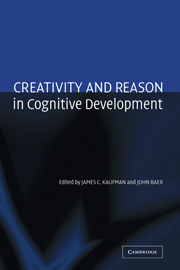Book contents
- Frontmatter
- Contents
- List of Contributors
- Acknowledgments
- Creativity and Reason in Cognitive Development
- Introduction
- COGNITIVE PERSPECTIVES
- DEVELOPMENTAL AND EDUCATIONAL PERSPECTIVES
- 12 Creativity in Young Children's Thought
- 13 A Young Artist's Story: Advancing Knowledge and the Development of Artistic Talent and Creativity in Children
- 14 Is It Reasonable to Be Creative?
- 15 Does Culture Always Matter: For Creativity, Yes, for Deductive Reasoning, No!
- 16 Higher Level Thinking in Gifted Education
- 17 The Relationship Among Schooling, Learning, and Creativity: “All Roads Lead to Creativity” or “You Can't Get There from Here”?
- 18 How Early School Experiences Impact Creativity: An Ecological Perspective
- 19 Conclusions
- Author Index
- Subject Index
- References
16 - Higher Level Thinking in Gifted Education
Published online by Cambridge University Press: 19 January 2010
- Frontmatter
- Contents
- List of Contributors
- Acknowledgments
- Creativity and Reason in Cognitive Development
- Introduction
- COGNITIVE PERSPECTIVES
- DEVELOPMENTAL AND EDUCATIONAL PERSPECTIVES
- 12 Creativity in Young Children's Thought
- 13 A Young Artist's Story: Advancing Knowledge and the Development of Artistic Talent and Creativity in Children
- 14 Is It Reasonable to Be Creative?
- 15 Does Culture Always Matter: For Creativity, Yes, for Deductive Reasoning, No!
- 16 Higher Level Thinking in Gifted Education
- 17 The Relationship Among Schooling, Learning, and Creativity: “All Roads Lead to Creativity” or “You Can't Get There from Here”?
- 18 How Early School Experiences Impact Creativity: An Ecological Perspective
- 19 Conclusions
- Author Index
- Subject Index
- References
Summary
Over the past decade, studies have continued to suggest the relationship between critical thinking and reasoning to high-level creative production within and across domains (Gardner, 2000; Csikszentmihalyi, 2000). In gifted education, becoming a creative producer in the real world is predicated on the acquisition of a combination of creative thinking, problem solving, and critical thinking within a domain.
Although earlier studies have shown that students show important gains in content-specific higher order skills such as literary analysis and persuasive writing in language arts (VanTassel-Baska, Avery, Hughes, & Little, 2000) or designing experiments in science (VanTassel-Baska, Bass, Reis, Poland, & Avery, 1998), studies have only recently demonstrated that a content-based intervention provided students with enhanced generic critical thinking and reasoning skills at the elementary level (Bracken, Bai, Fithian, Lamprecht, Little, & Quek, 2003; VanTassel-Baska & Bracken, in press).
Most K–12 programs for gifted students include some components of critical thinking as a fundamental part of the curriculum (Chandler, 2004). Only recently, however, have we begun to test the efficacy of curriculum in respect to student growth in this area at various stages of development, being satisfied instead to use proxy outcome data such as Advanced Placement (AP) and International Baccalaureate (IB) scores, SAT scores, or even state tests to tell us how well these students are performing at higher levels of thought (VanTassel-Baska & Feng, 2003).
Information
- Type
- Chapter
- Information
- Creativity and Reason in Cognitive Development , pp. 297 - 315Publisher: Cambridge University PressPrint publication year: 2006
References
Accessibility standard: Unknown
Why this information is here
This section outlines the accessibility features of this content - including support for screen readers, full keyboard navigation and high-contrast display options. This may not be relevant for you.Accessibility Information
- 1
- Cited by
